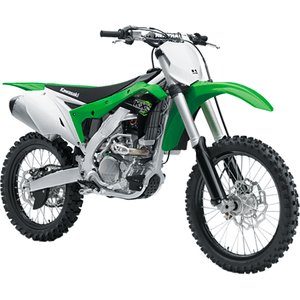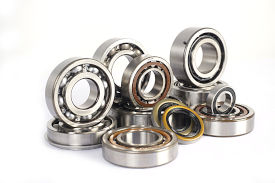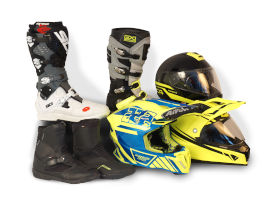Kawasaki KX250F (2006-2008): A Test Ride Through Time with Green Thunder
When you think of motocross legends, the Kawasaki KX250F deserves its place in the pantheon. Part of the first wave of modern four-stroke MX bikes that redefined track performance, the 2006-2008 KX250F remains a compelling machine even by today's standards. After throwing a leg over a meticulously maintained 2007 model, it’s clear why this bike still commands respect in the pits and nostalgia in riders’ hearts. Let’s break down what makes this generation special – and where it leaves room for upgrades.
Engine Performance: High-Revving Fury Meets Carbureted Charm
The beating heart of the KX250F is its 249cc liquid-cooled DOHC four-stroke engine. Kawasaki’s decision to stick with a carburetor (Keihin FCR37) during this era might raise eyebrows today, but there’s magic in its analog delivery. Cracking the throttle unleashes a linear powerband that builds aggressively from mid-range to its 13,500 RPM scream. The claimed 40 Nm (29.5 lb-ft) of torque at 11,500 RPM translates to explosive exits out of corners when kept boiling in the sweet spot.
What surprised me most was how modern it feels. The multi-map digital CDI with K-TRIC throttle sensing (a novelty in 2006) allows crisp response whether you’re feathering through ruts or hammering uphill. Yes, fuel-injected rivals offer more precise cold starts, but the FCR carb delivers a satisfyingly raw connection – provided you’re diligent with jetting adjustments for altitude or temperature changes.
Maintenance-wise, that 13.5:1 compression ratio demands respect. Regular valve checks and oil changes (every 10-15 engine hours) are non-negotiable. Pro tip: Swapping to a high-flow air filter (available at MOTOPARTS.store) helps this carb breathe easier in dusty conditions.
Chassis & Handling: Aluminum Agility Meets MX DNA
Kawasaki’s aluminum perimeter frame (introduced in 2006) was a game-changer. At 92.5 kg (204 lbs) dry, the KX250F feels shockingly light by modern standards – a trait magnified by its centralized mass. Tipping into berms requires minimal effort, and the 1,468 mm (57.8") wheelbase strikes a perfect balance between stability at speed and flickable cornering.
The riding position is classic motocross: narrow seat, aggressive peg placement, and a 960 mm (37.8") seat height that suits intermediate-to-tall riders. Newer riders might find the tall saddle intimidating, but it pays dividends when standing through whoops. Ground clearance (335 mm / 13.2") proved ample during my test, only occasionally grazing logs when pushed recklessly hard.
Suspension & Brakes: Adjustability Galore
Up front, the 47mm inverted Showa forks (16-way compression/rebound adjustable) handle everything from lazy trail rides to full send triples. Kawasaki’s decision to use a twin-chamber design in 2007-2008 models reduced oil cavitation, giving a plusher feel on successive hits compared to the 2006’s simpler setup.
Out back, the Uni-Trak linkage system (13-way low-speed compression, 17-way rebound) keeps the rear planted. Dialing in the sag took minutes, and the system ate up square-edged braking bumps without drama.
Braking evolved across this generation: - 2006: Single 240mm front disc (adequate but prone to fade) - 2007-2008: Dual 240mm front discs (stronger bite, better heat dissipation)
While not as refined as modern radial-mount setups, the Nissin calipers offer good feedback. Consider upgrading to sintered pads (available in our store) for harder track use.
Competition: How the KX250F Stacks Up
In the mid-2000s 250F class, three bikes ruled: 1. Honda CRF250R: More refined, but softer power delivery 2. Yamaha YZ250F: Bulletproof reliability, heavier feel 3. Suzuki RM-Z250: Sharp handling, notorious for crank issues
The KX250F carved its niche with: - Strongest Mid-Top Power: Advantageous for faster tracks - Class-Leading Ergonomics: Slimmer than CRF/RM-Z - Durability Edge: Less valve recession issues than Honda
Where it lagged: - Carb vs. EFI: Competitors moved to injection sooner - Suspension Tuning: Showa vs. Kayaba/KYB debates raged
Maintenance: Keeping the Green Machine Alive
Owning a 15-year-old MX warrior demands vigilance. Key considerations:
- Top End Rebuilds:
- Piston/rings every 30-50 hours
-
Inspect cam chain tensioner frequently
-
Valve Adjustments:
- Check clearance every 20 hours
-
Kibblewhite stainless valves (our top seller) extend service life
-
Carb TLC:
- Clean pilot jet monthly
-
Replace accelerator pump diaphragm annually
-
Suspension Refresh:
- Change fork oil every 60 hours
- Linkage bearing grease quarterly
Pro Upgrade Picks from MOTOPARTS.store: - Hinson Clutch Basket: Handles abuse better than stock - Tusk HD Spokes: Prevent mid-moto wheel failures - Boyesen Supercooler Kit: Lowers coolant temps by 12°C
Conclusion: A Timeless MX Icon That Rewards Dedication
Riding the 2006-2008 KX250F is like discovering a vintage sports car – it lacks modern driver aids but delivers purer feedback. Yes, you’ll spend more time tuning than on a fuel-injected bike, but mastering its quirks builds mechanical empathy. For riders who value analog thrill over digital precision, this Kawasaki remains a ticket to motocross nirvana. Just keep our parts catalog bookmarked – your wallet (and lap times) will thank you.
Specifications sheet
| Engine | |
|---|---|
| Stroke: | Four-stroke |
| Max torque: | 40 Nm |
| Fuel system: | Carburettor. Keihin FCR37 with hot start circuit |
| Displacement: | 249 ccm |
| Fuel control: | Double Overhead Cams/Twin Cam (DOHC) |
| Max torque @: | 11500 rpm |
| Bore x stroke: | 77.0 x 53.6 mm (3.0 x 2.1 in) |
| Configuration: | Single |
| Cooling system: | Liquid |
| Compression ratio: | 13.5:1 |
| Number of cylinders: | 1 |
| Valves per cylinder: | 4 |
| Dimensions | |
|---|---|
| Wheelbase: | 1468 mm (57.8 in) |
| Dry weight: | 93 |
| Seat height: | 955–960 mm (37.6–37.8 in) adjustable |
| Overall width: | 820 mm (32.3 in) |
| Overall height: | 1270 mm (50.0 in) |
| Overall length: | 2159 mm (85.0 in) |
| Ground clearance: | 335 mm (13.2 in) (2007-2008); 371 mm (14.6 in) (2006) |
| Fuel tank capacity: | 7.19 L (1.90 US gal) |
| Drivetrain | |
|---|---|
| Final drive: | chain |
| Transmission: | 5-speed |
| Maintenance | |
|---|---|
| Spark plugs: | Not specified in data |
| Valve clearance check interval: | Not specified in data |
| Chassis and Suspension | |
|---|---|
| Frame: | Aluminum perimeter |
| Rear tire: | 100/90-19 (2007-2008); 120/80-19 (2006) |
| Front tire: | 80/90-21 (2006-2007); 80/70-21 (2008) |
| Rear brakes: | Single disc |
| Front brakes: | Double disc (2007-2008); Single disc (2006) |
| Rear suspension: | UNI-TRAK® linkage system with adjustable compression and rebound damping / 310 mm (12.2 in) travel (2007-2008); Uni-Trak® with 22-way adjustments / 231 mm (9.1 in) travel (2006) |
| Front suspension: | 47mm inverted twin-chamber telescopic fork with 16-way compression and rebound damping / 315 mm (12.4 in) travel (2007-2008); 38mm leading axle, air-adjustable preload / 231 mm (9.1 in) travel (2006) |
| Rake (fork angle): | 27.7° |



















